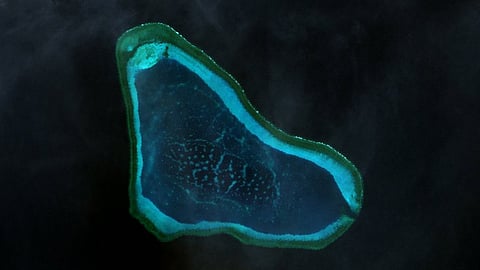

The Philippines said on Thursday it "strongly protests" China's plan to establish a nature reserve at a South China Sea shoal, as Beijing moves to reinforce its territorial claims and maritime rights in the contested region.
China has approved the creation of a national nature reserve at the disputed Scarborough Shoal. The designation was an "important guarantee" to preserve the atoll's ecosystem, China's State Council said.
The Philippine foreign ministry said China's action "clearly infringes" on Manila's rights and interests.
"The Philippines will be issuing a formal diplomatic protest against this illegitimate and unlawful action by China," it said in a statement.
Manila also called on Beijing to withdraw the designation and comply with international law, including the 1982 United Nations Convention on the Law of the Sea.
Manila's foreign ministry said the Philippines has sovereignty and jurisdiction over the shoal, which it calls Bajo de Masinloc, describing it as a "longstanding and integral part" of the Philippines.
Jay Batongbacal, an expert on maritime affairs and the law of the sea at the University of the Philippines, said China's action was a thinly veiled attempt to tighten Beijing's claims in the contested waters of the South China Sea.
He said it could also open the door to more aggressive tactics, including the arrests of Filipino fishermen.
China hopes that by, "clothing its actions as 'environmental protection' they will be able to dissuade countries from supporting Philippine activities and attempts to reintroduce traditional fishing on the shoal," Batongbacal said.
Sovereignty over the Scarborough Shoal has never been established. A landmark 2016 international court ruling on the South China Sea, which voided Beijing's sweeping claims to the region, was not tasked with establishing ownership.
But the court said China's blockade of the shoal violated international law and that the area was a traditional fishing ground for several countries, including the Philippines and Vietnam. China rejected the ruling.
The reef's northeast rim, where China intends to impose environmental restrictions, is the same area most commonly accessed by Filipino fishermen because it is sheltered from currents and waves, Batongbacal said.
Scarborough Shoal, named Huangyan Island by Beijing and also called Panatag Shoal in the Philippines, has been occupied by China since 2012. Both Manila and Beijing claim sovereignty over the shoal, which is prized for rich fisheries, its protective lagoon and proximity to major shipping lanes.
China's foreign ministry and its embassy in Manila did not immediately respond to requests for comment on the Philippines' protest.
China claims almost the entire South China Sea as outlined on maps by the "nine-dash line", which cuts into parts of the exclusive economic zones (EEZs) of Brunei, Indonesia, Malaysia, the Philippines and Vietnam. Beijing in November last year also defined a baseline of territorial waters around the disputed Scarborough Shoal.
Beijing, which has built manmade islands on top of other reefs in the South China Sea, some with missile systems and runways, has denied harming marine ecosystems in the region and has accused the Philippines of the same. Manila rejects that.
A 2023 report by the Centre for Strategic and International Studies found China's construction activity buried more than 4,600 acres (1,861 hectares) of reef. In addition, giant clam harvesting by Chinese fishermen damaged another 16,353 acres of coral reef.
The environmental dispute has become another flashpoint in the long-running territorial row between China and U.S. ally the Philippines in the South China Sea, a conduit for more than $3 trillion in annual ship-borne commerce.
"Our complaints and exposure of their destructive activities have been among the most effective in getting non-regional states to listen to our side," Batongbacal said.
Last month, a Chinese navy vessel collided with a Chinese coast guard vessel while attempting to disrupt a supply mission for Filipino fishermen at Scarborough Shoal, Philippine officials said. It was the first known collision between Chinese vessels in the area.
China's move to declare the disputed shoal a nature reserve "does not bode well for maritime cooperation," Batongbacal said.
(Reporting by Mikhail Flores and Karen Lema; Editing by David Stanway, Martin Petty and Tom Hogue)
